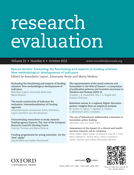
RESEARCH EVALUATION
Scope & Guideline
Elevating standards in education and information sciences.
Introduction
Aims and Scopes
- Research Quality Assessment:
The journal explores various methodologies for assessing research quality, including bibliometric analyses and qualitative evaluations, focusing on how these assessments influence academic behavior and institutional practices. - Impact Evaluation of Research:
A core aim is to evaluate the societal impact of research initiatives, investigating how research outcomes contribute to policy, practice, and community engagement. - Funding Mechanisms and Policies:
The journal examines different funding models, including lottery systems and performance-based funding, and their effects on research productivity and collaboration among academics. - Interdisciplinary Approaches:
It promotes understanding of interdisciplinary research and its evaluation, highlighting how diverse academic fields can collaborate to address complex societal challenges. - Stakeholder Engagement:
The journal emphasizes the importance of engaging stakeholders in the research process, assessing how co-production and participatory approaches enhance research relevance and impact.
Trending and Emerging
- Societal Impact of Research:
There is a growing emphasis on understanding and measuring the societal impact of research, particularly how academic outputs translate into tangible benefits for communities and policy. - Funding Innovation and Efficiency:
Recent publications focus on innovative funding models, such as lottery systems and their implications for fairness and efficiency in research grant allocation. - Collaborative and Transdisciplinary Research:
The journal increasingly highlights the importance of collaboration across disciplines, promoting studies that assess the impact of transdisciplinary approaches on research outcomes. - Qualitative Evaluation Approaches:
Emerging methodologies that prioritize qualitative assessments of research quality and impact are gaining traction, reflecting a shift from quantitative metrics to more nuanced evaluations. - Researcher Well-being and Academic Culture:
There is a rising interest in the well-being of researchers and the impact of evaluation systems on academic culture, particularly regarding issues of burnout and work-life balance.
Declining or Waning
- Traditional Metrics of Research Performance:
There appears to be a waning focus on conventional metrics such as citation counts and impact factors, as the discourse shifts towards qualitative assessments and broader measures of research impact. - Purely Academic Perspectives:
There is a noticeable decline in papers that focus solely on academic perspectives without considering societal implications, reflecting a shift towards more integrated evaluations that account for real-world impact. - Normative Theories of Research Evaluation:
Theoretical discussions centered on normative frameworks for research evaluation are diminishing, as empirical studies and practical applications take precedence in the journal's content. - Single-Discipline Studies:
Research focusing exclusively on single disciplines is less frequent, indicating a trend towards interdisciplinary studies that examine cross-field collaborations and their impacts. - Critiques of Peer Review Alone:
While peer review remains a topic of interest, critical discussions solely about its flaws without proposing alternative evaluation frameworks are becoming less prominent.
Similar Journals
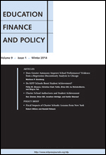
Education Finance and Policy
Advancing equity through financial insight.Education Finance and Policy is a prestigious academic journal dedicated to the critical examination of financial policies in education, aiming to bridge the gap between policy developments and educational equity. Published by MIT Press, this journal is a vital resource for researchers, policymakers, and practitioners in the field of education. With a distinguished Q1 ranking in Education for 2023 and a solid position within the 64th percentile in Scopus ranks, it serves as a leading platform for innovative research and scholarly discourse. Though currently not open access, the journal provides rich insights into the complexities of educational finance systems amidst evolving funding landscapes. Its continuous publication since 2011 guarantees a comprehensive repository of cutting-edge studies and analyses, reinforcing its role as an essential reference for those seeking to advance knowledge and practice in education finance.
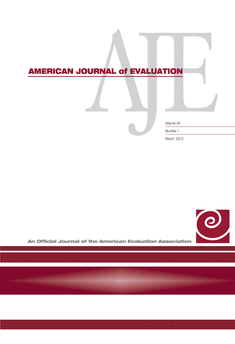
AMERICAN JOURNAL OF EVALUATION
Connecting Scholars: A Hub for Evaluation ExcellenceThe American Journal of Evaluation, published by SAGE Publications Inc, serves as a premier interdisciplinary platform for scholars and practitioners to disseminate cutting-edge research and methodologies in the field of evaluation. With an impressive impact factor and ranking in the top quartile across multiple disciplines—such as Business and International Management, Education, Health (Social Science), Sociology, and Social Psychology—the journal provides critical insights essential for effective evaluation practices. Operating since 1981, the journal embraces the challenges and innovations in evaluating programs, policies, and practices, making it an invaluable resource for researchers, professionals, and students dedicated to enhancing efficacy in various sectors. The Open Access model allows for broader dissemination of knowledge, ensuring that pivotal research reaches a diverse global audience. This journal stands out as a significant contributor to the ongoing dialogue and advancement in the art and science of evaluation.
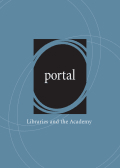
PORTAL-LIBRARIES AND THE ACADEMY
Empowering Librarians and Researchers for Future ChallengesPORTAL: Libraries and the Academy is an esteemed academic journal published by Johns Hopkins University Press, focusing on the intersection of library and information science, academic practice, and scholarly communication. With an ISSN of 1531-2542 and an E-ISSN of 1530-7131, this journal offers rigorous peer-reviewed research essential for librarians, researchers, and information professionals committed to enhancing academic libraries and fostering innovative practices in higher education. It holds a strong position in its field, ranking in the 61st percentile within Social Sciences and Library and Information Sciences, and categorized as Q2 in both Development and Library and Information Sciences for 2023. Though the journal is not Open Access, its content is invaluable for anyone interested in staying abreast of the latest trends and challenges in library services and academic environments. Since its inception in 2001, PORTAL has continuously contributed to the discourse on the evolving role of libraries in academia, making it a critical resource for those striving to bridge the gap between information access and higher education pedagogy.

Publications is a leading international journal published by MDPI, based in Switzerland, that has been at the forefront of scholarly communication since its inception in 2013. As an Open Access journal, it aims to disseminate high-quality research across multiple disciplines, notably in Business and International Management, Communication, Computer Science Applications, Library and Information Sciences, and Media Technology. Its impressive standing is reflected in its 2023 Scopus ranks, with top quartile positions across various fields, including a Q1 ranking in Library and Information Sciences and Media Technology. With a commitment to promoting innovation and collaboration, Publications serves as an essential platform for researchers, professionals, and students alike, allowing them to engage with the latest findings and discourse. The journal's strategic focus on accessibility ensures that knowledge is available to a global audience, fostering an environment conducive to academic and practical advancements. The E-ISSN 2304-6775 identifies its distinct digital presence, making it an invaluable resource for anyone passionate about cutting-edge research.

Information Retrieval Journal
Unlocking Potential in Data DiscoveryThe Information Retrieval Journal, published by SPRINGER, is a premier peer-reviewed publication dedicated to the dynamic field of information retrieval, encompassing techniques, algorithms, and applications that enhance the usability of data systems. Since its inception in 1999, it has established itself as a leading venue for scholarly articles and research findings, boasting an impressive ranking within the quartiles: Q2 in Information Systems and Q1 in Library and Information Sciences as of 2023. With a significant Scopus ranking, placing it in the top 15% of Library and Information Sciences and the top 29% of Computer Science - Information Systems, the journal serves as a vital resource for researchers, professionals, and students seeking to advance their understanding and contribute to this ever-evolving field. The journal is based in the Netherlands, continuing to influence global discourse in information science without the constraints of Open Access, ensuring a broad reach of researched knowledge through established academic channels.
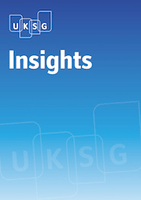
Insights-The UKSG Journal
Championing Quality Research for Tomorrow's Libraries.Insights - The UKSG Journal, published by UBIQUITY PRESS LTD, serves as a pivotal resource in the Library and Information Sciences field, boasting an impressive Q2 ranking in the 2023 category quartiles. Since its transition to an Open Access model in 2012, the journal has committed to disseminating high-quality research and innovative practices, making valuable contributions to the academic community. With a focus on significant trends and developments in information services and their implications on research and academia, Insights offers an inclusive platform for researchers, professionals, and students alike. The journal spans from 2012 to 2024, ensuring a comprehensive archive of contemporary scholarship. By adhering to the rigor of peer-review and encouraging interdisciplinary dialogue, Insights continues to enhance its impact and relevance, ranking at #111 out of 280 in Scopus for Social Sciences, while remaining dedicated to fostering advancement in library practice.

DESIDOC Journal of Library & Information Technology
Innovative Insights for the Future of Information ManagementDESIDOC Journal of Library & Information Technology, published by the Defence Scientific Information Documentation Centre, is a pivotal scholarly platform in the realm of Library and Information Sciences. The journal, indexed with ISSN 0974-0643 and E-ISSN 0976-4658, has established its reputation with a commendable Q3 category ranking in the latest Scopus quartiles and a notable rank of 113 out of 280 in its field, placing it in the 59th percentile. Engaging a global audience, it disseminates high-quality research insights aimed at advancing the practices and technologies within library and information management. Operating within a converged timeframe from 2012 to 2024, the journal is committed to fostering robust discussions surrounding contemporary issues in the field, making it an invaluable resource for researchers, professionals, and students alike. While currently not offering open access, its content is accessible through institutional subscriptions, reinforcing its significance in the academic community of India and beyond.
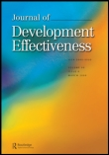
Journal of Development Effectiveness
Evaluating Success in Development: Research That MattersJournal of Development Effectiveness, published by ROUTLEDGE JOURNALS, TAYLOR & FRANCIS LTD, is a vital resource for scholars and practitioners engaged in the fields of development studies, geography, and planning. This esteemed journal, with ISSN 1943-9342 and E-ISSN 1943-9407, has been pivotal in providing a platform for research that critically evaluates and enhances the effectiveness of development interventions globally. With a significant impact factor reflecting its robust contributions to the field, the journal operates within the United Kingdom and spans several disciplines, evidenced by its 2023 Scopus ranking in the Q3 category for both Development and Geography, Planning and Development. The journal encompasses a wide range of topics from policy analysis to case studies on development practices, thereby appealing to a diverse audience of researchers, professionals, and students. As it continues to publish quarterly from 2009 to 2024, the Journal of Development Effectiveness stands out as an essential scholarly resource, promoting evidence-based approaches that address the complexities of development in today's rapidly changing world.

Voluntas
Exploring the Nexus of Voluntary Action and Social ChangeVoluntas, published by Springer, is a leading international journal committed to advancing the fields of Business and International Management, Geography, Planning and Development, Public Administration, Sociology, and Political Science. With an impressive impact factor and ranking in the Q1 category across multiple disciplines, the journal serves as a vital resource for scholars and practitioners seeking to explore the intersections of voluntary action, social responsibility, and public policy. Covering a converged period from 1990 to 2024, Voluntas not only publishes high-quality empirical research but also seeks to disseminate theoretical insights that promote understanding and engagement with pressing societal issues. Researchers, professionals, and students alike will find a wealth of knowledge that enhances their understanding of the complexities of voluntary organizations and their impact on the world today. For access options and more information, please visit the publisher's website.
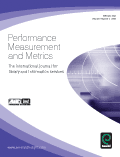
Performance Measurement and Metrics
Enhancing Understanding through Rigorous Measurement PracticesPerformance Measurement and Metrics is an esteemed journal published by EMERALD GROUP PUBLISHING LTD, focusing on the critical intersections of performance measurement and metrics within the domains of Library and Information Sciences and Literature and Literary Theory. With an ISSN of 1467-8047 and an E-ISSN of 1758-6925, this journal serves as a pivotal resource for researchers, practitioners, and students keen on understanding and applying innovative measurement techniques to enhance performance in these fields. The journal has established a commendable reputation, ranking in the Q2 category for Library and Information Sciences and Q1 in Literature and Literary Theory as of 2023. Its Scopus rank of #96/280 in Social Sciences indicates a 65th percentile standing, reinforcing its relevance and scholarly impact. Although it does not currently operate as an open-access journal, its wide publication scope from 2000 to 2024 ensures a comprehensive collection of research articles, case studies, and theoretical discussions pivotal for advancing knowledge and practice in the field.